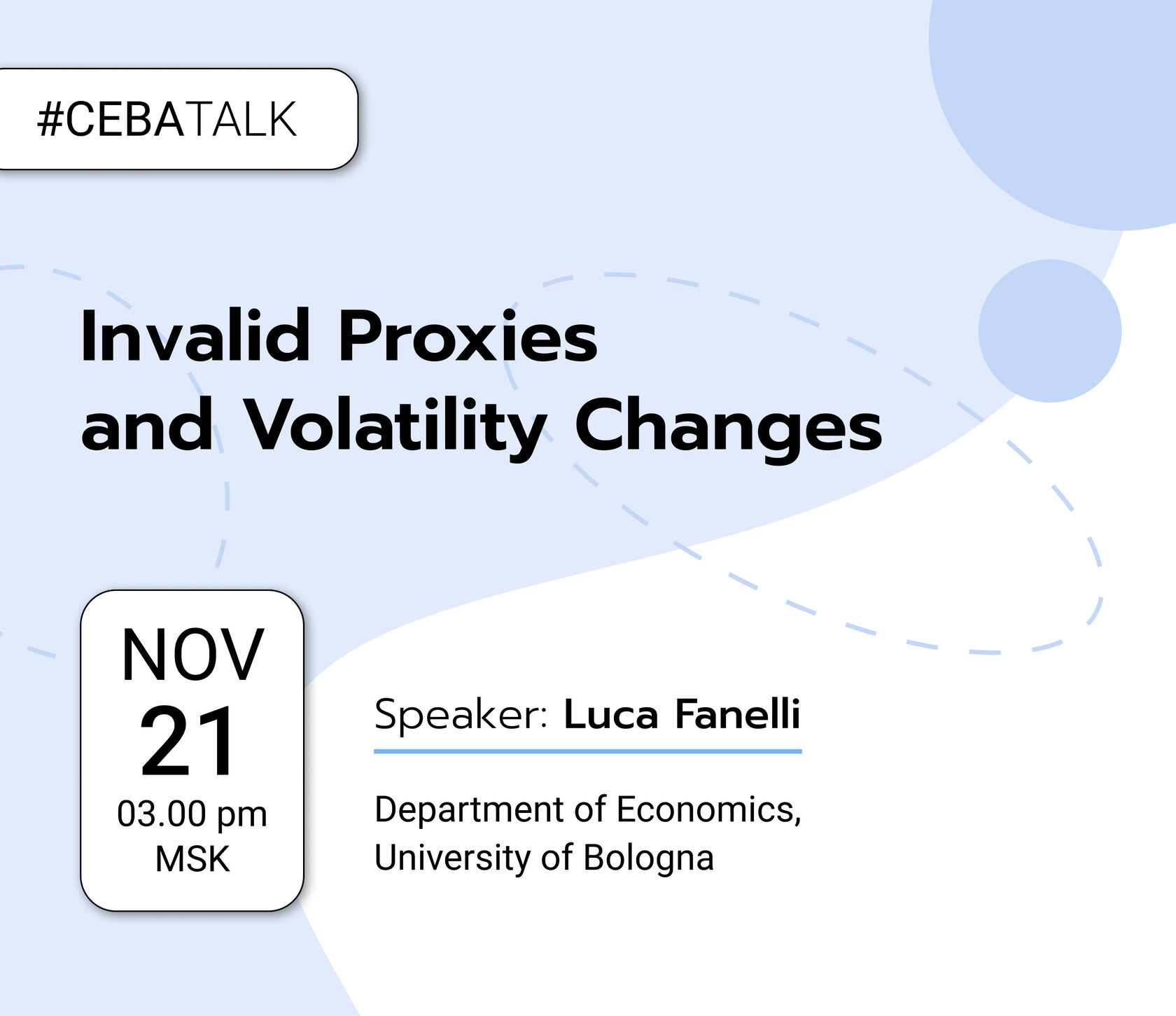Time: 21st November (Tuesday) 15.00 Moscow time
Speaker: Luca Fanelli (Department of Economics, University of Bologna)
Title: Invalid Proxies and Volatility Changes
Field of study
"Macroeconometrics, Time Series Econometrics, Empirical Macroeconomics."
What problem is your research intended to solve?
"Can we safely use external instruments to identify and estimate structural shocks of interest when proxy-SVARs are characterized by exogenous, nonrecurring breaks in unconditional volatility?"
What did your research find?
"If the moment conditions arising from changes in volatility are sufficient to point-identify the target structural shocks and if the stability restrictions are correctly specified by the econometrician, even "invalid" external instruments can effectively aid in identifying the structural shocks of interest."
Abstract: When in proxy-SVARs the covariance matrix of VAR innovations is subject to exogenous, permanent (nonrecurring) breaks that generate target impulse response functions (IRFs) that change across volatility regimes, even strong, exogenous external instruments can result in inconsistent estimates if the breaks are not properly accounted for. In such cases, it is essential to explicitly incorporate the shifts in unconditional volatility in order to point-identify the target structural shocks and possibly restore consistency. We show that if a necessary and sufficient rank condition that exploits the moments implied by the changes in volatility holds, the target IRFs can be point-identified and estimated consistently. Importantly, standard asymptotic inference applies despite (i) the covariance between the proxies and the instrumented structural shocks being local-to-zero as in Staiger and Stock (1997), (ii) instruments exogeneity possibly fails. It turns out that external instruments never compromise the inference on the dynamic causal effects exerted by the target shocks. In the worst-case scenario, they merely serve as labels for the target structural shocks. We present a novel identification strategy that appropriately combines external instruments with "informative" changes in volatility regimes, thereby avoiding the need to assume proxy relevance and exogeneity in estimation. We illustrate the usefulness of the suggested method by reexamining some proxy-SVARs previously estimated in the existing literature, focusing in particular on the identification and estimation of US fiscal multipliers.
More information, a link to the research and the upcoming seminar here.
We are looking forward to seeing you!
Speaker: Luca Fanelli (Department of Economics, University of Bologna)
Title: Invalid Proxies and Volatility Changes
Field of study
"Macroeconometrics, Time Series Econometrics, Empirical Macroeconomics."
What problem is your research intended to solve?
"Can we safely use external instruments to identify and estimate structural shocks of interest when proxy-SVARs are characterized by exogenous, nonrecurring breaks in unconditional volatility?"
What did your research find?
"If the moment conditions arising from changes in volatility are sufficient to point-identify the target structural shocks and if the stability restrictions are correctly specified by the econometrician, even "invalid" external instruments can effectively aid in identifying the structural shocks of interest."
Abstract: When in proxy-SVARs the covariance matrix of VAR innovations is subject to exogenous, permanent (nonrecurring) breaks that generate target impulse response functions (IRFs) that change across volatility regimes, even strong, exogenous external instruments can result in inconsistent estimates if the breaks are not properly accounted for. In such cases, it is essential to explicitly incorporate the shifts in unconditional volatility in order to point-identify the target structural shocks and possibly restore consistency. We show that if a necessary and sufficient rank condition that exploits the moments implied by the changes in volatility holds, the target IRFs can be point-identified and estimated consistently. Importantly, standard asymptotic inference applies despite (i) the covariance between the proxies and the instrumented structural shocks being local-to-zero as in Staiger and Stock (1997), (ii) instruments exogeneity possibly fails. It turns out that external instruments never compromise the inference on the dynamic causal effects exerted by the target shocks. In the worst-case scenario, they merely serve as labels for the target structural shocks. We present a novel identification strategy that appropriately combines external instruments with "informative" changes in volatility regimes, thereby avoiding the need to assume proxy relevance and exogeneity in estimation. We illustrate the usefulness of the suggested method by reexamining some proxy-SVARs previously estimated in the existing literature, focusing in particular on the identification and estimation of US fiscal multipliers.
More information, a link to the research and the upcoming seminar here.
We are looking forward to seeing you!
